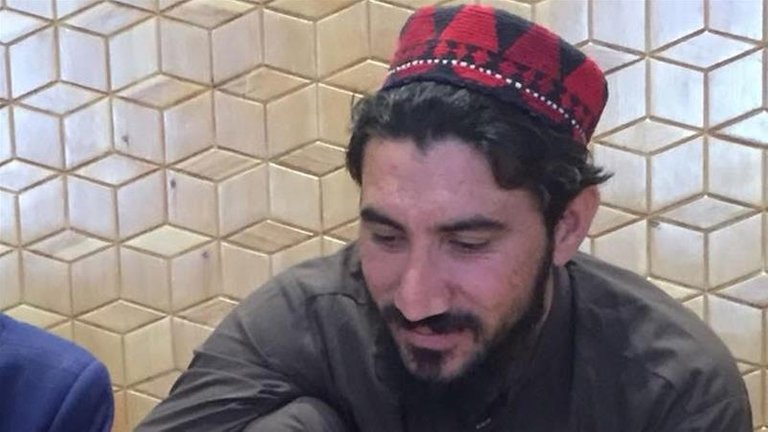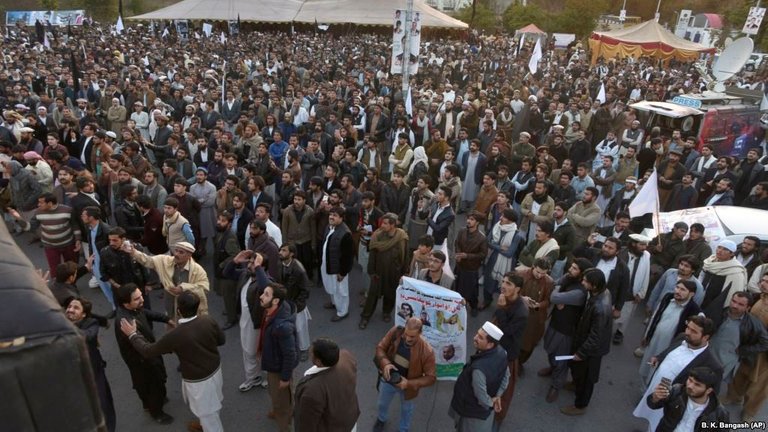Manzoor Ahmed Pashteen
is often seen wearing a red and black cap.The story goes that he received the hat from a poorly paid worker in his hometown of Sarwakai district, in the northwest region of South Waziristan of Pakistan.
The 26-year-old gave the worker his new hat and took the worn red and black in return.

"I gave him my hat without any doubt, why not?" Pashteen told Al Jazeera.
The hat has become something of a symbol: the design is now used by those who support Pashteen's cause, to fight for the rights and protection of Pakistan's Pashtun citizens.
His popularity has increased to such an extent that some of his followers, as a gesture of respect, have begun to refer to themselves by his surname.
Approximately 15 percent of Pakistan's 207 million people is Pashtun, according to the country's 1998 census. The cause of Pashtun citizens took special prominence earlier this year.
On the night of January 3, Naqeebullah Mehsud, a 27-year-old father and aspiring model of Waziristan, was forcibly abducted during an attack by police personnel in Karachi. He disappeared for at least 10 days.
On January 13, police said they had killed four "terrorists" suspected of having ties to the Islamic State of Iraq and the Levante group (ISIL, also known as ISIS) and the Taliban of Pakistan.
One of the four killed was Mehsud. The police officer who led the operation, Rao Anwar, said Mehsud was killed in a shootout.
A police investigation ordered by the Supreme Court of Pakistan later revealed that Anwar had presided over 444 murders in 745 police shootings.
The investigation found no evidence of Anwar's claim that Mehsud was a "terrorist." Anwar is now fleeing.
Protests

The young man's death sparked a string of protests, manifesting in thousands camping out for a sit-in in the Pakistani capital, Islamabad, for 10 days, under the banner of being a "Pashtun Long March" .
Pashteen, who graduated in veterinary medicine from Gomal University in Dera Ismail Khan, was one of a group of young activists who founded the Mehsud Tahafuz Movement in 2014 - an organisation for the protection of the people of their tribe - the Mehsuds.
Known as a hardworking man who grew up in poverty, Pashteen's father, a teacher at a local school, did not earn enough to feed his family of eight and used to take on loans to fill the financial gap.
"[Pashteen] never aims to earn money from anything he does, all he wants to do is fight for the rights of Pashtuns," said Noor Rehman Mehsud, a member of the movement and one of Naqeebullah Mehsud's cousins.
Describing Pashteen as a fierce and brave activist, Noor Rehman told Al Jazeera that it was "not easy to raise your voice against the government and the Pakistan army".
"In this country, you cannot fight against the army and the government, this is a very sensitive line that you cannot cross. You have to work with them. We have always expressed our concerns in a peaceful manner and so has Pashteen, so that people who have been killed unlawfully get justice."
The Pakistan army launched an offensive in 2009 against the Pakistan Taliban in pockets of South Waziristan, displacing the group into neighbouring districts.
In a series of operations across the country's northwest since then, the military says it has now effectively destroyed the Pakistan Taliban's infrastructure in the country. It claims the group is now operating from provinces on the Afghan side of Pakistan's northwestern border.
The human cost of the conflict propelled Pashteen towards activism.
He and his comrades took up the cause of the more than 600,000 Mehsuds displaced by the military, forced to abandon their homes as the army fought pitched battles with Taliban fighters in a drawn-out operation.
The military now says South Waziristan is safe for residents to return, but many continue to stay away, saying their homes have been destroyed and the government has not yet built facilities for basic service delivery.
"When I started the movement, I use to go from house to house and tell people what was going on in our area in terms of injustice and atrocities," Pashteen told Al Jazeera.
"But most of the time, I would get a reply from them: 'Pashteen, you will get killed. Don't do this.'"
'Our national cause'
According to Pashteen, he was forced to abandon his hometown, kept in unlawful detention and often harassed for suspected links with armed groups in Pakistan and across the border in Afghanistan.
"Everyone knows, it is a common thing said to us by the military forces near checkpoints 'esko murgha banao' [translated as: make him a rooster. A common form of punishment in South Asia, where the person takes a position of squatting and then holding the ears]." he said, adding that the position was an utter state of humiliation.
The Pakistani military was not immediately available for a comment, but has previously denied any wrongdoing.
As news of Naqeebullah Mehsud's killing spread earlier this year, Pashteen and his fellow activists led protesters from the town of Dera Ismail Khan, where many Mehsuds have settled since the military operation began.
In support of Pashteen's cause, Hashim Khan wears the red-and-black hat and changed his last name to 'Pashteen' [Al Jazeera]
As their numbers grew, boosted by support from across Pakistan, the group changed its name to the Pashtun Tahafuz Movement, or Movement for the Protection of Pashtuns.
Hashim Khan, a member of Pakhtunkhwa Milli Awami Party (PkMAP), a Pashtun nationalist political party, is among those who says he has changed his last name to Pashteen and wears the red-and-black hat.
"I participated in Pashteen's [march] in Quetta without my party flag because we nationalists knew this is our national cause," said Khan.
The PTM has broadened its initial set of demands, which focused on getting justice for Naqeebullah's murder, to include a reduction of military-enforced curfews in the country's tribal areas; the production of thousands of missing persons believed to have been held by the military; and the formation of a judicial commission to investigate police killings of "terrorism" suspects.
'Missing persons'
As part of his activism, Pashteen often sent statistics and pictures of those affected by the government's fight against the Taliban to local journalists, to highlight the human impact of the war.
In one of his interviews in March to local Pakistani media, Pashteen claimed that tens of thousands of people were missing in FATA. Al Jazeera is unable to independently verify that figure.
A government-run judicial commission on enforced disappearances says at least 1,640 people are missing across Pakistan as of February 2018, although rights activists say that number is vastly understated.
Families of the missing live with the uncertainty of not knowing whether their children are dead or alive.
Calling Pashteen "the son of the Pakistani soil", Said Alam Mehsud, a cofounder of the Pashtun Tahafuz Movement, told Al Jazeera: "In FATA, where there is no political, economic and social development, Manzoor Pashteen is the first person from FATA to speak out publicly and openly about what was in the peoples' hearts and minds".
'Case against Pashteen'
On Tuesday, Pakistani police registered cases against Pashteen for criticising the country's military during the Pashtun Long March.
He is accused of "wantonly giving provocation with intent to cause [a] riot", and if convicted, faces up to five years in prison.
"Whatever we are doing, we are doing within the law. We have the right to protest. This is our basic human right. And by lodging the [police report], they are pressurising us," Said Alam Mehsud told Al Jazeera.
"This also takes attention away from the extrajudicial killing of Naqeebullah Mehsud by Rao Anwar, who is still at large.
Pashteen is determined to remain persistent until the demands of PTM are met, despite the lack of support from his family, as they are worried for his life.
"My father, wife and mother expect every day to hear the news of my death or disappearance. They are worried for me and sometimes, angry at me," he said, adding that he wants a better future for Pashtuns in Pakistan "including my month old daughter".
"But I know deep down, beneath all the worry, they are proud of me because this is not about me, it is about making this country a better place for us to live in."
Hi! I am a robot. I just upvoted you! I found similar content that readers might be interested in:
https://www.aljazeera.com/news/2018/03/manzoor-pashteen-voice-pashtuns-pakistan-180314091327342.html
Very well written article! You have a talent, develop it. I follow you, I'm always glad to make new acquaintances, I hope you will follow me.
Welcome to steemit
You can join this discord channel to be taught how to go about how to succeed on steemit and learn business,poetry,art,crypto and get motivated,taught how to make good posts and comment
https://discord.gg/WaeJXmE
Join the discord channel today and learn something in the academy of life